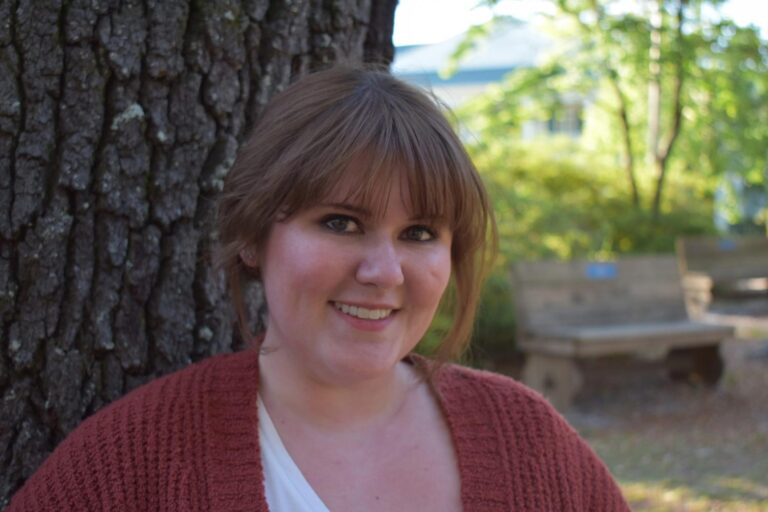Caroline Fryar, a fourth-year medical student at UNC, is taking the goals of HHIVE out of Greenlaw 524 and into the world. In 2010, Fryar served as an undergraduate member of HHIVE, and fondly remembers attending Grand Rounds events and writing blog posts about them. While she was unable to participate in any of the studies, such as the Falls Narrative study or Dance and Diabetes, she says that the little corner of HHIVE that she experienced was “so amazing and enlightening,” and encouraged her to continue to think critically about the health humanities in her medical career. Her favorite outing was seeing Margaret Edson’s one-act play, Wit, at Playmakers Repertory Company. The play tells the story of the final hours of a young professor dying of ovarian cancer. Wit was a unique experience for Fryar, as it was one of the first times she had seen a patient’s experience represented in a play; it was a new form of narrative medicine that has stayed with her for many years.
Now, ten years later, Fryar is back at HHIVE as a graduate student. She is currently in her fourth year at the UNC School of Medicine and is staying for a fifth year to work towards a Master’s in Public Health. After graduation, she plans to practice family medicine in rural North Carolina. As part of her MPH, she is a member of Professor Jane Thrailkill’s English 695 class, which is an interdisciplinary research class focused on aging and the arts. The course focuses on analyzing society’s relationship to aging and the elderly, creating comprehensive conversations surrounding age, and thinking about how we can portray aging through the arts and engaging older adults in art.
Her involvement with HHIVE and the principles of health humanities does not end in the classroom. In 2017, she took a group of fellow medical students to the Breath, Body, and Voice conference at Duke University. The conference focused heavily on the intersections of the humanities, health, and social justice, as well as how the three are consistently intertwined in real-life medical practice. Fryar says that this experience helped her deepen her relationships with her colleagues and expose her fellow medical students to the health humanities. Additionally, they were all encouraged to think deeper about medicine through the lens of social justice. Fryar is also a member of the Gold Humanism Honors Society in the School of Medicine, which honors fourth year medical students, professors, and physicians who exemplify patient-centered care. Fryar was nominated in 2019 by her peers and professors for being a shining example of practicing humanism in medicine.
When asked about how her time at HHIVE makes her a better doctor and medical student, Fryar points out that sometimes, it makes you a worse medical student. “The health humanities give you a lens to look at something that is often times too easily simplified,” she says. Sometimes, that lens makes the job harder, because you are always considering a point of view beyond the biomedical and thinking about deeper connections, such as the role of society, families, and personal identity. Despite this fact, Fryar would not trade her health humanities education for anything. One of the most helpful lessons that she learned at HHIVE concerns storytelling. She describes an integral part of her role as a physician as “…listening to stories and being able to tell a story back, so it’s good to have the skills of listening and storytelling.” Through learning how to view medical histories and charts as a narrative, Fryar feels that she is able to connect with her patients on a deeper level and provide them with better, more focused, and more individualistic care.
Fryar’s advice for both undergraduate and graduate students looking to get involved in HHIVE is to write everything down and to ask questions. Lastly, she encourages anyone considering the health humanities to “just jump in!” She describes HHIVE as a welcoming, kind, and fun space where students and professors can forge genuine connections and think critically about health and medicine, even if they are not in the medical field. According to Fryar, “it has plenty of research opportunities and is open to all kinds of questions and interdisciplinary exploration. If you have an idea for a project and have no idea where to start, come to HHIVE.”
 Spencer Margaret Tackett is a senior at UNC-Chapel Hill studying English on the medicine, literature, and culture track with a minor in medical anthropology. She has been volunteering with HHIVE since 2019 and plans to go into social work after graduation.
Spencer Margaret Tackett is a senior at UNC-Chapel Hill studying English on the medicine, literature, and culture track with a minor in medical anthropology. She has been volunteering with HHIVE since 2019 and plans to go into social work after graduation.


